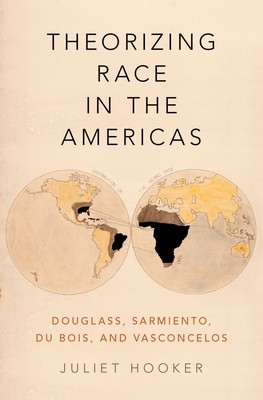
- We will send in 10–14 business days.
- Author: Juliet Hooker
- Publisher: Oxford University Press, USA
- ISBN-10: 0190633697
- ISBN-13: 9780190633691
- Format: 15.8 x 23.9 x 2.3 cm, kieti viršeliai
- Language: English
- SAVE -10% with code: EXTRA
Reviews
Description
In 1845 two thinkers from the American hemisphere - the Argentinean statesman Domingo Faustino Sarmiento, and the fugitive ex-slave, abolitionist leader, and orator from the United States, Frederick Douglass - both published their first works. Each would become the most famous and enduring texts in what were both prolific careers, and they ensured Sarmiento and Douglass' position as leading figures in the canon of Latin American and U.S. African-American political thought, respectively. But despite the fact that both deal directly with key political and philosophical questions in the Americas, Douglass and Sarmiento, like African-American and Latin American thought more generally, are never read alongside each other. This may be because their ideas about race differed dramatically. Sarmiento advocated the Europeanization of Latin America and espoused a virulent form of anti-indigenous racism, while Douglass opposed slavery and defended the full humanity of black persons. Still,
as Juliet Hooker contends, looking at the two together allows one to chart a hemispheric intellectual geography of race that challenges political theory's preoccupation with and assumptions about East / West comparisons, and questions the use of comparison as a tool in the production of theory and philosophy.
EXTRA 10 % discount with code: EXTRA
The promotion ends in 21d.06:13:55
The discount code is valid when purchasing from 10 €. Discounts do not stack.
- Author: Juliet Hooker
- Publisher: Oxford University Press, USA
- ISBN-10: 0190633697
- ISBN-13: 9780190633691
- Format: 15.8 x 23.9 x 2.3 cm, kieti viršeliai
- Language: English English
In 1845 two thinkers from the American hemisphere - the Argentinean statesman Domingo Faustino Sarmiento, and the fugitive ex-slave, abolitionist leader, and orator from the United States, Frederick Douglass - both published their first works. Each would become the most famous and enduring texts in what were both prolific careers, and they ensured Sarmiento and Douglass' position as leading figures in the canon of Latin American and U.S. African-American political thought, respectively. But despite the fact that both deal directly with key political and philosophical questions in the Americas, Douglass and Sarmiento, like African-American and Latin American thought more generally, are never read alongside each other. This may be because their ideas about race differed dramatically. Sarmiento advocated the Europeanization of Latin America and espoused a virulent form of anti-indigenous racism, while Douglass opposed slavery and defended the full humanity of black persons. Still,
as Juliet Hooker contends, looking at the two together allows one to chart a hemispheric intellectual geography of race that challenges political theory's preoccupation with and assumptions about East / West comparisons, and questions the use of comparison as a tool in the production of theory and philosophy.


Reviews